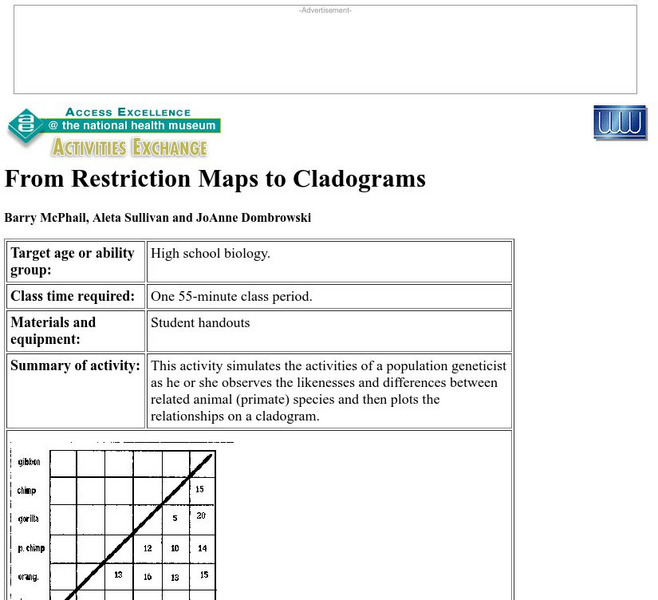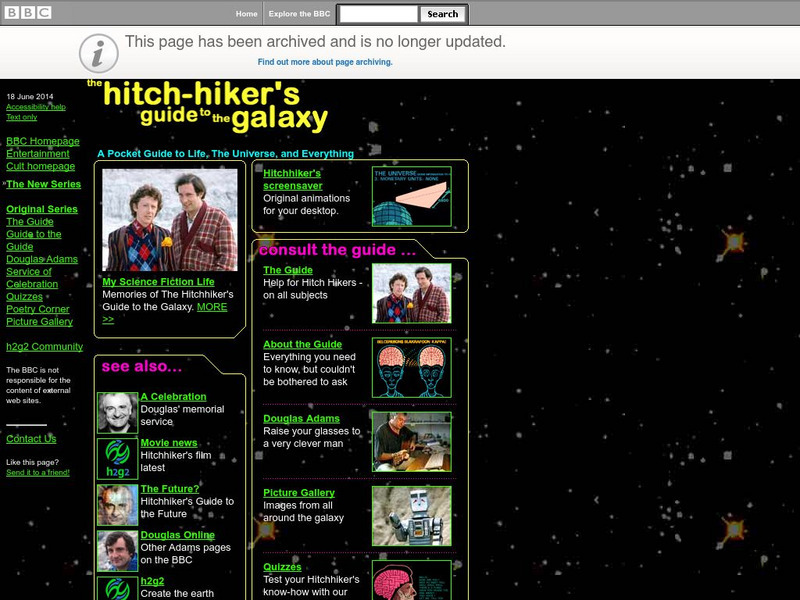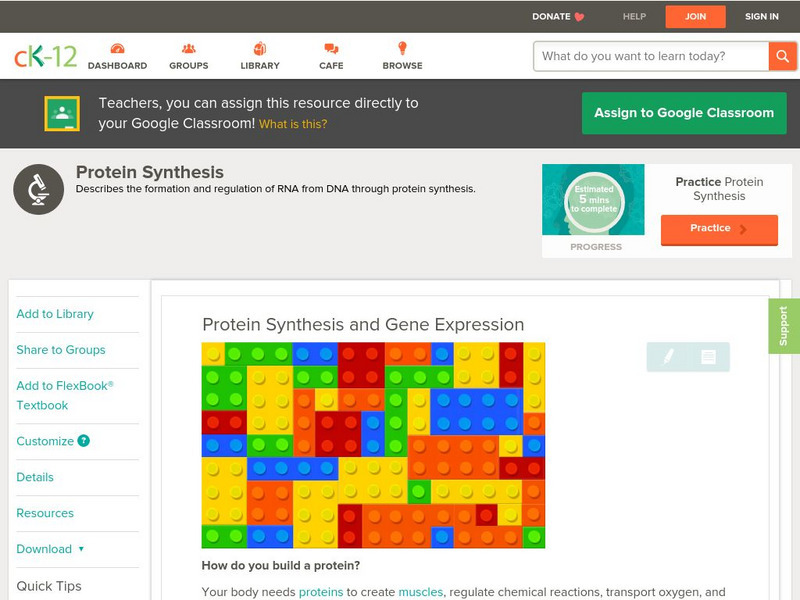Hi, what do you want to do?
Cold Spring Harbor Laboratory
Dolan Dna Learning Center: Dna Transformation
Through animated images, follow the experiment which created the first custom-made organism containing recombinant DNA.
Other
Canadian Centre for Dna Barcoding
The Canadian Centre for DNA Barcoding was started in 2003 by Dr. Paul Hebert. He came up with the idea of barcoding the DNA of all known species and creating a database to them. You can find a good explanation of what DNA barcoding is,...
PBS
Pbs Learning Media: Dna Barcode Library
Botanists and biologists work to create a DNA barcode library for plant life in this video segment from New York Voices.
National Health Museum
Nhm: Restriction Maps to Cladograms Lesson
This lesson plan requires students to analyze DNA restriction maps to determine the differences in the sequence for several primates and humans. They then use the information to create a cladogram.
Other
Douglas adams.com Dna
This section of the Douglas Adams site features a biography of Adams (1952-2001 CE), as well as several articles and a short story by Adams. "The Private Life of Ghengis Khan," is a treat for readers who have read only Douglas' novels.
Natural History Museum
Nhm: From Bodies to Bones and Back Again
Can dinosaurs be recreated like in the movie Jurassic Park? This resource describes the reality of re-creating a genetic blueprint of dinosaurs.
American Institute of Biological Sciences
Action Bioscience: Dna Patents Create Monopolies on Living Organisms
An article that argues patenting living organisms is unethical. Check out the argument and accompanying resources.
National Health Museum
Access Excellence: Molecular Biology/primate Phylogeny
This lesson plan involves comparison of amino acids to create a phylogenetic tree of primates. Learners will also use other species information to draw conclusions about evolutionary relationships.
National Health Museum
Nhm: Amino Acid Sequences Show Evolution
This lesson plan focuses on differences in the amino acid sequence of hemoglobin and myoglobin proteins. They use the number of differences to create a phylogenetic tree.
University of Illinois
University of Illinois Urbana Champaign: Theoretical Biophysics Group
Excellent and comprehensive site created by the University of Illinois at Urbana-Champaign, Beckman Institute for Advanced Science and Technology. The site has resources about and links to information on a large number of topics in...
Other
Live Science: World's Most Elusive Rat Dead After 18 Week Chase
Rats are resilient creatures than can create havoc if left unmonitored. That's why scientists decided to let loose a foot long rat on a deserted island. Learn what scientist now know about controlling the ever elusive Norway rat.
CK-12 Foundation
Ck 12: Life Science: Rna
[Free Registration/Login may be required to access all resource tools.] DNA contains the instructions to create proteins, but it does not make proteins itself. DNA is located in the nucleus, which it never leaves, while proteins are made...
CK-12 Foundation
Ck 12: Life Science: Translation of Rna to Protein
[Free Registration/Login may be required to access all resource tools.] The mRNA, which is transcribed from the DNA in the nucleus, carries the directions for the protein-making process. mRNA tells the ribosome how to create a specific...
BBC
Bb Ci: The Hitchhiker's Guide to the Galaxy
Fun site containing information about the world created by the book. Also contains links to information on the author, Douglas Adams.
Exploratorium
Exploratorium: Science Snacks: Gel Electrophoresis
An activity to create gel electrophoresis on a budget! This activity has students building their own gel electrophoresis and then using electricity to separate the dyes.
CPALMS
Florida State University Cpalms: Florida Students: The Story of Our Start
Learn how offspring are created through the processes of sexual and asexual reproduction.
Sophia Learning
Sophia: Transcription: Lesson 2
This lesson will explain how the process of transcription is used to create RNA, complementary to a cell's DNA. It is 2 of 3 in the series titled "Transcription."
Sophia Learning
Sophia: Transcription: Lesson 3
This lesson will explain how the process of transcription is used to create RNA, complementary to a cell's DNA. It is 3 of 3 in the series titled "Transcription."
PBS
Pbs Teachers: Scientific American: Never Say Die: How to Make a Nose
Investigate breakthroughs in stem cell research, and explore the structure and function of a DNA molecule. Create a model of a DNA from tagboard.
University of Arizona
Actividad No. 2 Con El Adn De La Familia Blackett
How can you use data from STR close relatives to create a genetic profile of a missing person? How much genetic diversity exists between brothers? These and other questions will be answered with these activities.
PBS
Pbs Teachers: Scientific American: The Channel Island Fox
Explore the clues that archaeologists and other scientists use to piece together a picture of the past. Create models to compare and contrast the geology of two islands, and compare the characteristics of various types of fibers.
PBS
Pbs: Nova: Making Vaccines
Here's some virtual hands on experience for students. There are many types of vaccines and students may have a hard time understanding the processes. This interactive site requires the student to go through each procedure to make a type...
CK-12 Foundation
Ck 12: Life Science: Protein Synthesis and Gene Expression
[Free Registration/Login may be required to access all resource tools.] The DNA sequence contains the instructions to place units called amino acids into a specific order. When these amino acid are assembled in that specific order,...
CK-12 Foundation
Ck 12: Life Science: Cloning
[Free Registration/Login may be required to access all resource tools.] Cloning is the process of creating an exact replica of an organism. The clone's DNA is exactly the same as the parent's DNA. Bacteria and plants have long been able...


























